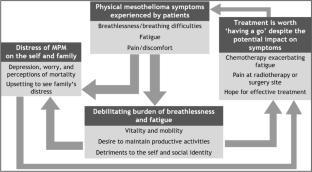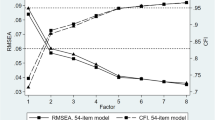Abstract
Background
Malignant pleural mesothelioma (MPM) is a rare and usually fatal malignancy frequently linked to occupational asbestos exposures and associated with poor prognosis and considerable humanistic burden. The study aimed to develop conceptual models of the health-related quality of life (HRQoL) impact on patients with and receiving treatment for MPM, and the burden on their caregivers.
Methods
This multi-country study (Australia and United Kingdom) adopted a qualitative methodology to conduct semi-structured, independent interviews with people with MPM (n = 26), current caregivers (n = 20), and caregivers of people who had recently died because of MPM (n = 4). Participants were recruited using a purposive sampling approach and interviews conducted via telephone between January 2021 and January 2022. Transcripts were analysed using thematic analysis and used to construct conceptual models.
Results
Patient analysis yielded four overarching themes: (1) debilitating burden of breathlessness and fatigue; (2) physical mesothelioma symptoms experienced by patients; (3) distress of MPM on the self and family; and (4) treatment is worth ‘having a go’ despite the potential impact on symptoms. Caregiver analysis yielded five core themes: (1) daily life limited by caregiving duties; (2) emotional well-being and the need for support; (3) the relational role shift to caregiver; (4) time spent providing care negatively impacts work and productivity; and (5) positive aspects and outcomes of caregiving.
Conclusions
This study highlights the substantial daily and emotional HRQoL impact that MPM symptoms have on patients and caregivers. Both groups reduced work, productivity, and social and leisure activities. There was evidence of positive HRQoL impacts as a result of immunotherapy and radiotherapy, but less for chemotherapy. Caregiver impacts were intensified during the end-of-life period and persisted following patient death. Evident is a need for increased psychological support, information, and advice for caregivers, increased during the end-of-life period.


Similar content being viewed by others
Availability of data and materials
Participant data are not available for distribution due to confidentiality. Interview discussion guide and coding inquiries can be directed to adam.gibson@phmr.com.
References
Hamra G, Loomis D, Dement J. Examining the association of lung cancer and highly correlated fibre size-specific asbestos exposures with a hierarchical Bayesian model. Occup Environ Med. 2014;71:353–7.
Røe OD, Stella GM. Malignant pleural mesothelioma: history, controversy, and future of a man-made epidemic. Eur Respir Rev. 2017;24:115–31.
Van Zandwijk N, Clarke, C., Henderson, D., Musk, W., Fong, K, Penman, A. Guidelines for the diagnosis and treatment of malignant pleural mesothelioma. J Thorac Dis. 2013;5(6):E254-E307.
Ettinger D. NCCN guidelines insights: malignant pleural mesothelioma, version 3.2016. Off J Natl Comprehen Cancer Netw. 2016;14(7):825-36.
Cavone D, Caputi A, De Maria L, Cannone ESS, Mansi F, Vimercati L. Epidemiology of mesothelioma. Environments 2019;6(7):76.
Bianchi C, Bianchi T. Global mesothelioma epidemic: trend and features. Indian J Occupat Environ Med. 2014;18(2):82-8.
Krówczyńska M, Wilk E. Asbestos Exposure and the Mesothelioma Incidence in Poland. Int J Environ Res Public Health. 2018;15(8):1741.
Musk ABW, de Klerk N, Brims FJ. Mesothelioma in Australia: a review. Med J Aust. 2017;207(10):449–52.
Shah N, Williams, A. Surviving the asbestos epidemic. Insurance Digest (European). 2001:14-8.
Tsao A, Wistuba I, Roth JA, Kindler HL. Malignant pleural mesothelioma. J Clin Oncol. 2009;27(12):2081–90.
Baas P, Scherpereel A, Nowak AK, Fujimoto N, Peters S, Zalcman G. First-line nivolumab plus ipilimumab in unresectable malignant pleural mesothelioma (CheckMate 743): a multicentre, randomised, open-label, phase 3 trial. The Lancet. 2021;397(10272):375-86.
Nakajima E, Vellanki, J., Larkins, E., Chatterjee, Mishra-Kalyani, PS, Donoghue, M. FDA approval summary: nivolumab in combination with ipilimumab for the treatment of unresectable malignant pleural mesothelioma. Clin Cancer Res. 2022;28(3):446-51.
EMA. Assessment report: ipilimumab/nivolumab (EMA/CHMP/260350/2021). EMA; 2021:1–164.
PBS. Submission: nivolumab plus ipilimumab. Retrieved from: https://wwwpbsgovau/industry/listing/elements/pbac-meetings/psd/2021-03/files/nivolumab-plus-ipilimumab-psd-mar-2021docx. 24th June 2022. 2021:1-42.
Kondola S, Manners D, Nowak AK. Malignant pleural mesothelioma: an update on diagnosis and treatment options. Ther Adv Respir Dis. 2016;10(3):275–88.
Girgis S, Smith AB, Lamber S, Waller A, Girgis A. ‘It sort of hit me like a baseball bat between the eyes’: a qualitative study of the psychosocial experiences of mesothelioma patients and carers. Support Care Cancer. 2019;27(2):631–8.
Sturges J, Hanrahan KJ. Comparing telephone and face-to-face qualitative interviewing: a research note. Qual Res. 2004;4(1):107–18.
NHMRC. National Statement on Ethical Conduct in Human Research 2007 (Updated 2018). www.nhmrc.gov.au/guidelines/publications/e72: National Health and Medical Research Council; 2018.
Clarke V, Braun, V. Thematic analysis. In: Michalos AC (ed) Encyclopaedia of quality of life and well-being research. Springer, Dordrecht. 2014.
Coast J. Qualitative methods for health economics: rowan and littlefield international; 2017.
Silverman D. Doing qualitative research: a practical handbook. London: SAGE; 2010.
Guest G, Bunce A, Johnson L. An experiment with data saturation and variability. Field Methods. 2006;18(1):59–82.
Moore S, Darlison L, Tod AM. Living with mesothelioma: a literture review European. J Cancer Care. 2010;19:458–68.
Brims F, Gunatilake, S., Lawrie, I., Marshall, L., Fogg, C, Chauhan, AJ. Early specialist palliative care on quality of life for malignant pleural mesothelioma: a randomised controlled trial. Thorax. 2019;74:354-61.
Arber A, Spener L. ‘It’s all bad news’: the first 3 months following a diagnosis of malignant pleural mesothelioma. Psychooncology. 2013;22(7):1528–33.
Hughes N, Arber A. The lived eperience of patients with pleural mesothelioma. Int J Palliat Nurs. 2009;14(2):66–71.
Ejegi-Memeg S, Sherborne, V., Harrison, M., Taylor, B., Senek, M, Gardiner, C. Patients’ and informal carers’ experience of living with mesothelioma: a systematic rapid review and synthesis of the literature. Eur J Oncol Nurs. 2022;58:102122.
Harrison M, Gardiner C, Taylor B, Ejegi-Memeh S, Darlison L. Understanding the palliative care needs and experiences of people with mesothelioma and their family carers: an integrative systematic review. Palliat Med. 2021;35(6):1039–51.
Warby A, Dhillon HM, Kao S, Vardy JL. A survey of patient and caregiver experience with malignant pleural mesothelioma. Support Care Cancer. 2019;27:4675–86.
Henson K, Wickramasinghe B, Pitman A. Risk of suicide after cancer diagnosis in England. JAMA Psychiatry. 2019;76(1):51–60.
Acknowledgements
The authors would like to thank the patients and caregivers who participated for their valuable contributions and without whom this research would not have been possible.
Funding
This study was funded by Bristol-Myers Squibb.
Author information
Authors and Affiliations
Contributions
AG contributed to the conception and design, data acquisition, data analysis, and data interpretation. WA contributed to data analysis and data interpretation. LL, BB, MD, and LD contributed to the conception and design, as well as data interpretation. All authors reviewed the manuscript.
Corresponding author
Ethics declarations
Conflict of interest
The authors declare no competing interests.
Ethical approval
The study design and conduct were reviewed and received ethical approval prior to commencement by an independent ethical review board, WIRB (WCG IRB, www.wcgirb.com). All interviewees provided recorded consent to participate and for use of their data in this research and publication.
Supplementary Information
Below is the link to the electronic supplementary material.
Rights and permissions
Springer Nature or its licensor (e.g. a society or other partner) holds exclusive rights to this article under a publishing agreement with the author(s) or other rightsholder(s); author self-archiving of the accepted manuscript version of this article is solely governed by the terms of such publishing agreement and applicable law.
About this article
Cite this article
Gibson, A.E.J., Ahmed, W., Longworth, L. et al. Development of Patient and Caregiver Conceptual Models Investigating the Health-Related Quality of Life Impacts of Malignant Pleural Mesothelioma. Patient (2024). https://doi.org/10.1007/s40271-024-00690-x
Accepted:
Published:
DOI: https://doi.org/10.1007/s40271-024-00690-x




